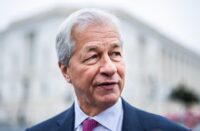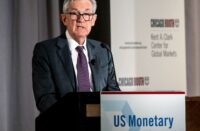Acting Director of the Office of Management and Budget (OMB), Russell Vought, recently addressed the media at a press conference in Washington, D.C. This event took place on March 11, 2019. Consumer Financial Protection Bureau (CFPB) employees received instructions on Sunday to work from home as their headquarters in Washington, D.C. will remain closed until February 14. This news was revealed through a memo that CNBC managed to acquire.
CFPB’s Chief Operating Officer, Adam Martinez, issued the memo. It came on the heels of an email from recently appointed acting CFPB director, Russell Vought, which asked staff to put a pause on virtually all regulatory activities, including the supervision of financial institutions.
These events unfolded in the wake of uncertainty surrounding the future of the CFPB and its personnel following the arrival of personnel from Elon Musk’s DOGE at the regulatory body the previous week. These DOGE personnel have been granted access to CFPB data sources, including staff performance reviews, according to anonymous sources who requested anonymity due to fear of retaliation.
Last year, Musk had suggested that the CFPB should be abolished. He endorsed this sentiment on Friday by posting “CFPB RIP” on his X social media platform.
In addition to putting a stop to almost all CFPB operations with his initial memo, Vought also announced on X on Saturday that he was suspending the influx of new funding to the agency. Vought, who was confirmed as President Donald Trump’s head of the OMB on Thursday, is among the key contributors to Project 2025, a blueprint to transform the federal government.
Neither the CFPB nor a spokesperson for Musk responded immediately to requests for comments.
Employees of the CFPB are now preparing for the possibility of administrative leave or layoffs, much like what Trump officials have tried with the U.S. Agency for International Development. While the CFPB has roughly 1,700 employees, only several hundred have roles that the law requires to exist.
Mass layoffs could imperil the mission of the CFPB, which was established following the 2008 financial crisis to protect Americans from predatory practices by banks and other financial entities. Banking industry groups have consistently criticized the CFPB for what they perceive as bias and have legally challenged the bureau’s regulations, even going as far as trying to declare the bureau unconstitutional.
Several CFPB initiatives that could have saved consumers billions of dollars are now at risk. These include limits on credit card and overdraft fees, as well as a regulation that could have eliminated $49 billion in medical bills from the credit reports of 15 million Americans.




